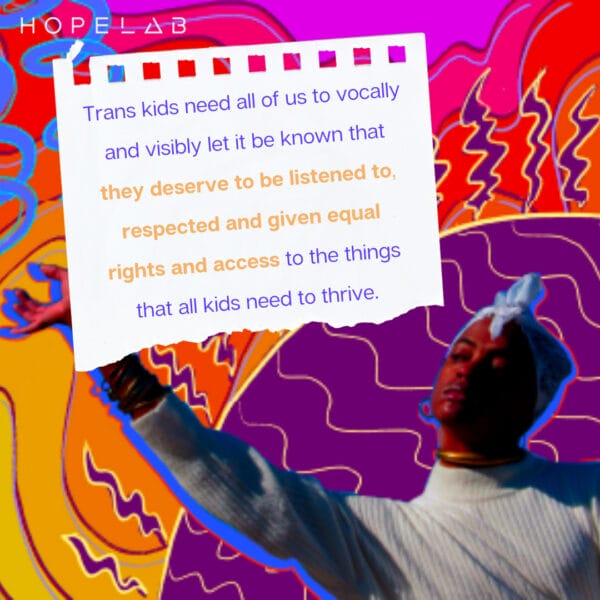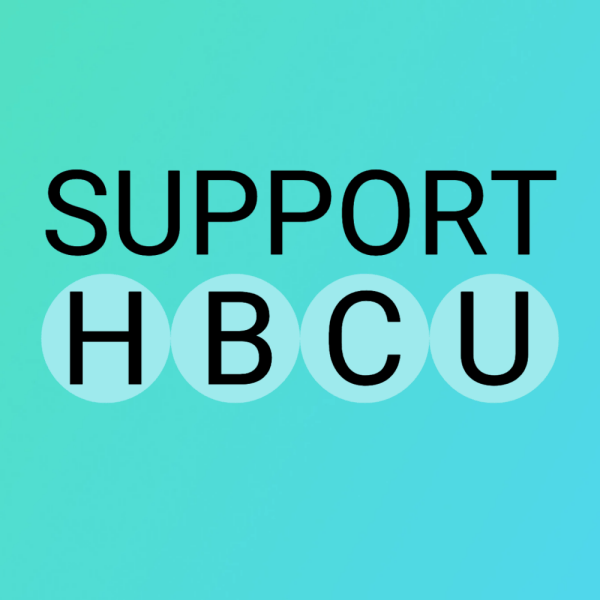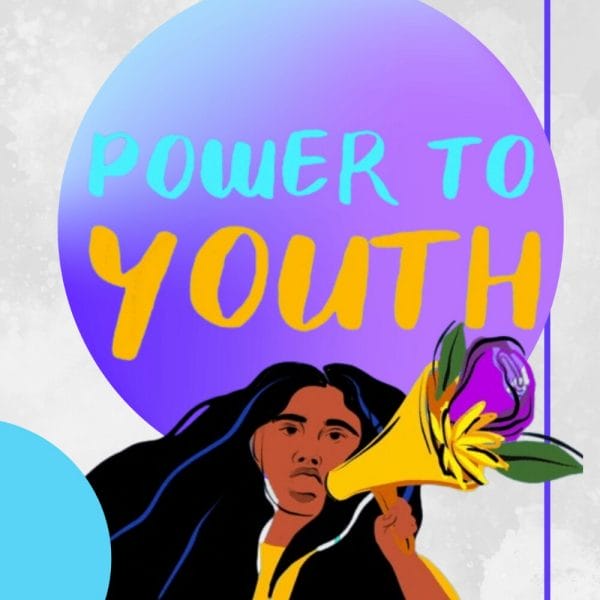*feature image artwork by Brenda Montano
This interview has been edited for length and clarity.
Hopelab: How would you characterize these policies and their potential impact on trans and other LGBTQ+ youth? What does science and evidence tell us about the potential impact of these policies?
Alison Cerezo, MA, PhD: These policies are solely political and are in no way based in science. In fact, the science shows that LGBTQ+ youth benefit tremendously from adult support and affirmation of their sexual orientation and gender identity. These policies stand in direct contrast to recommendations from the American Psychological Association, American Medical Association and many other professional health organizations that advise social and medical gender-affirming healthcare as pivotal to LGBTQ+ youth’s health and well-being.
Angela Kade Goepferd, MD: I would characterize these policies and their potential impact on LGBTQ+ youth, and particularly transgender youth and their families, as terrorism. As a parent, I can’t imagine facing child abuse charges for loving my child and supporting them to be who they are and explore their authentic identity. As a pediatrician, I can’t imagine being charged with a felony and having my license revoked for providing gender-affirming healthcare to kids and teenagers that has been supported through evidence-based research and expert opinion by every major medical society in this country (AAP, APA, CDC, Society for Adolescent Health and Medicine) and across the world. LGBTQ+, and particularly transgender, youth living in states where government legislation is introduced that seeks to ban them from competing in sports, accessing health care or public facilities (restrooms), causes increased stigmatization and contributes to increased rates of depression, anxiety and suicidality.
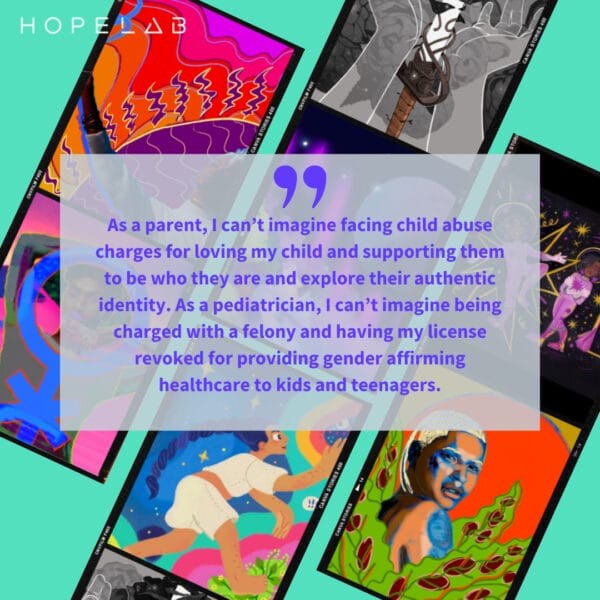
Multiple images: Credit to — Art Twink, Kurrese Bolds, Valerie Liu, Eduardo Valadez
Shannon Dunlap, MSW, PhD: These recent policies fail to uphold the human rights, dignity, and self-worth of all people and especially those who disproportionately experience violence and oppression within systems theoretically designed to protect them. For transgender and nonbinary (TGNB) [and LGBTQ+] children, adolescents and their parents, these policies represent state-sanctioned discrimination and harassment. Politicians do not have the knowledge and training to regulate access to medically necessary and life-affirming medical care and treatment. Governor Abbott’s order in Texas is dangerous for all TGNB children/adolescents and families but particularly for Black, Indigenous and TGNB youth/families of color who simultaneously experience institutionalized racism and trans-related oppression.
The evidence demonstrates that minority stress (rejection, discrimination, non-affirmation, harassment, internalized stigma) are related to suicidality, depression, and anxiety among TGNB and LGBTQ+ adolescents/youth; parental acceptance and support for TGNB and LGBTQ+ adolescents mitigates these deleterious health outcomes and increases capacity to thrive; and living in a toxic social climate can lead to poor educational and health outcomes. These policies perpetuate a toxic climate by institutionalizing stigma, discrimination, rejection, and harassment of TGNB adolescents and their families; and at the same time these policies create barriers to building communities of support, acceptance, and safety needed for young people to be affirmed for who they are and subsequently thrive.
Hopelab: What do we know about the need for and benefits of gender-affirming health care for these youth and their families?
Angela Kade Goepferd, MD: No two children are alike. Each has their own unique needs, especially when it comes to the healthcare they receive. This is true for all kids, regardless of gender identity, but especially true for transgender and gender diverse kids, who are navigating their care in an increasingly hostile social environment. Gender-affirming care for transgender youth has long been supported by several professional medical societies, including the American Academy of Pediatrics, who have urged that youth who identify as transgender have access to comprehensive, gender-affirming and developmentally appropriate care. Given the nuances and uniqueness of each child, this care should be informed by the parents and clinicians who know the child best. Furthermore, studies show that for young people who identify as transgender, gender-affirming care can decrease behavioral and emotional distress, and has positive effects on body image and overall well-being while reducing thoughts of suicide
Shannon Dunlap, MSW, PhD: Trans healthcare is often not only gender-affirming, but lifesaving. Access to lifesaving gender-affirming care and interventions are a basic human right. Parents are responsible for ensuring their child has access to all life-affirming and lifesaving medical and mental health interventions. Not all TGNB youth want or need access to gender-affirming health care but for those that do both need and want this intervention, that should be their decision to make with informed consent and ideally with the support of their parents. Adolescents without access to this care and who need and want this care often experience extreme distress including suicidality related to their body developing [or having developed] in ways that mirror an assigned sex and gender that is not their own. This decision is not for politicians to make; this decision is for adolescents and youth along with the support of their parents and trained and knowledgeable trans-affirming healthcare providers to decide.
Hopelab: For kids and families living in states affected by these bills and policies, what is most important for these youth and families to know in the face of these attacks?
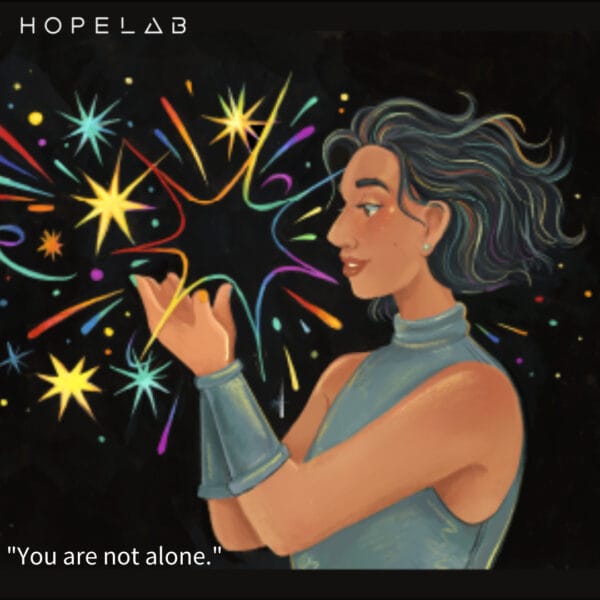
Artwork credit: Valerie Liu
José Arturo Bauermeister, MPH, PhD: You are not alone. Please reach out to national resources to support you and your family if you are encountering challenges in your local communities.
Alison Cerezo, MA, PhD: Medical and mental health professionals are trained to support you just as you are. Our professional training makes it abundantly clear that LGBTQ+ youth are healthy and resilient. It is political, misinformed attacks like the legislation in Texas and Florida that are the problem.
Angela Kade Goepferd, MD: There are pediatricians like me out here, fighting for you and standing up for your rights. You and your child deserve the very best evidence-based medical care available, delivered with compassion and tailored to the unique needs of your child.
Shannon Dunlap, MSW, PhD: You are not alone and that this is a civil rights issue. Your journey is validated and important. You have millions of personal and professional allies who see you, hear you, and are willing to fight alongside you. The American Medical Association and the National Association of Social Workers, Texas support you. If you need support, contact organizations such as the Trevor Project, Transforming Families and Gender Spectrum Groups who can provide resources and support.
Hopelab: How can people around the country be most supportive of these youth and families? What steps can people take to fight these attacks?
José Arturo Bauermeister, MPH, PhD: We must be active in our advocacy. More than ever, it is crucial to remain engaged and challenge/appeal these policies. Contact local LGBTQ advocacy groups in your community and/or connect online with national champions on how to get involved at the local, state or national level (e.g., https://www.hrc.org/events).
Alison Cerezo, MA, PhD: Make sure to support advocacy efforts in the local Texas and Florida areas most affected by recent legislation. Both of these regions have a high proportion of youth of color. It is therefore imperative that advocacy efforts and resources be made available in multiple languages.
Angela Kade Goepferd, MD: What our trans and gender diverse kids need now more than ever is culture change. Regardless of which state you live in or your profession, trans kids need all of us to vocally and visibly let it be known that they deserve to be listened to, respected and given equal rights and access to the things that all kids need to thrive, including a supportive school environment, participating in sports with their peers and access to gender-affirming medical care. Have the hard conversation with your neighbor, your parents, your cousin or whoever else needs to hear this message and refer them to places like www.genderspectrum or Family Acceptance Project ® | (sfsu.edu) to learn more.
Hopelab: What does the future look like for the kids and families affected by these bills and policies? What interventions, technology or other innovations may be able to provide support?
José Arturo Bauermeister, MPH, PhD: These bills and policies will take time to make their way through the legal appeal process, but their impact on LGBTQ+ youth and families is already here. Hopelab has been working with our lab along with CenterLink and the It Gets Better Project to develop a new resource for LGBTQ+ youth launching in June which will provide additional evidence-backed support to the community. You can learn more about this new tool and sign up to be notified when it is launched at www.imiguide.org.
Angela Kade Goepferd, MD: The unfortunate truth is that, even if these bills get overturned – in the short term this will significantly impact kids’ health and mental health. Families are already looking to leave states with restrictive bills and policies for states where they can access care, but many don’t have the resources to even consider this type of relocation. What will result is a significant disparity in care where only certain families in certain geographic locations will have access (very similar to what has happened to comprehensive reproductive and abortion care across the U.S.). Medical professionals need to be able to help support one another across state lines, via telehealth or other means, to provide care to patients.
Shannon Dunlap, MSW, PhD: The future for trans kids and families is informed by strength, community, perseverance, and love. For kids and families in these states, there lies a huge fight ahead. The civil rights movement for LGBTQ+ folx has made amazing strides, but like all civil rights movements and issues, it will demand time, wide community support, and protective legislation. You are not alone on this road.
Check these resources out for more information and support. If you have more to add, we would love to hear from you.
Contact your senators
Ask them to pass the Federal Equality Act
ACLU
LGBTQ Rights
CenterLink
Nationwide LGBTQ+ community center directory
Center for the Developing Adolescent Support for Transgender Youth
Policies, practices, and care that accept and affirm young people’s gender identities
Family Acceptance Project ®
A research, intervention, education and policy initiative to prevent health and mental health risks for LGBTQ children and youth
gender spectrum
Creating gender-sensitive and inclusive environments for all children and teens
GLSEN
Working to champion and affirm LGBTQ+ youth in K-12 education
Human Rights Campaign
Find events happening in your area.
Human Rights Campaign Resources for Parents
Understanding the basics — transgender children & youth
Trans Lifeline
A trans-led organization connecting trans people to community, support, and resources
Transforming Family
Family support group creating a positive environment for children, adolescents and their families to explore issues of gender identity
Transformations Project
Find and track hateful legislation proposals that threaten the health and safety of vulnerable youth and their families
Trevor Project
A national organization providing crisis intervention and suicide prevention services to LGBTQ+ youth
Q Chat Space
A community for LGBTQ+ teens




